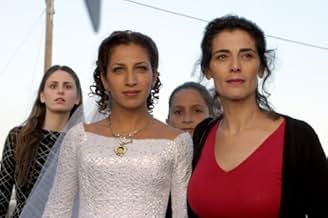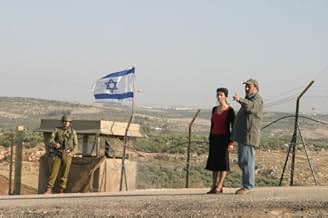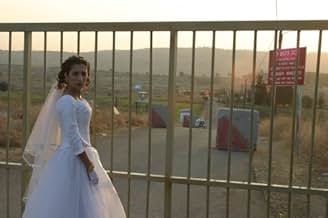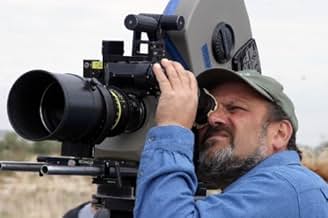Adicionar um enredo no seu idiomaIn Majdal Shams, the largest Druze village in Golan Heights on the Israeli-Syrian border, the Druze bride Mona is engaged to get married with Tallel, a television comedian that works in the ... Ler tudoIn Majdal Shams, the largest Druze village in Golan Heights on the Israeli-Syrian border, the Druze bride Mona is engaged to get married with Tallel, a television comedian that works in the Revolution Studios in Damascus, Syria. They have never met each other because of the occup... Ler tudoIn Majdal Shams, the largest Druze village in Golan Heights on the Israeli-Syrian border, the Druze bride Mona is engaged to get married with Tallel, a television comedian that works in the Revolution Studios in Damascus, Syria. They have never met each other because of the occupation of the area by Israel since 1967; when Mona moves to Syria, she will lose her undefi... Ler tudo
- Prêmios
- 8 vitórias e 15 indicações no total
- Amal
- (as Hiyam Abbass)
- Hammed
- (as Makram J. Khoury)
- Marwan
- (as Ashraf Barhoum)
- Evelyna
- (as Evelyne Kaplun)
- Amin
- (as Adnan Trabshi)
- The Mother
- (as Marlene Bajjali)
- Simon
- (as Uri Gabriel)
- Joseph
- (as Robert Hoenig)
- Direção
- Roteiristas
- Elenco e equipe completos
- Produção, bilheteria e muito mais no IMDbPro
Avaliações em destaque
Mona (Clara Khoury), a young Druze bride is to be wed to Syrian TV-star Tallel (Derar Sliman) from Damascus, a man she has never met. Since neither country recognizes the other diplomatically, once the bride crosses the border to Syria, she will never be allowed to return to Israel and her wedding day, usually a day of great joy, may be one of her saddest. While the film tells us much about the sad realities of the political fragmentation in the Middle East, it is also a story with social and cultural ramifications. Mona's sister Amal (Hiyam Abbas), whose expressive face frames the film's beginning and end, is stuck in an unhappy marriage. She wants to attend Haifa University but is thwarted by her husband Amin (Adnan Trabshi) who is afraid of losing face in the village and of relinquishing "control".
Mona's father Hammed (Makram Khoury), a pro-Syrian agitator known to Israeli police, is forbidden to travel to the Syrian border to say goodbye to his daughter. He harbors resentment and refuses to welcome his son Hattem (Eyad Sheety) and his Russian wife home from Moscow because he broke family tradition and moved away eight years ago. Another son, Marwan (Ashraf Barhom), a businessman, is welcomed by the family but is rejected by an angry former girlfriend, a French Red Cross worker (Julie-Anne Roth), who works in the village. Mona's character is mostly symbolic and she has little to say, yet the story of the film is written on her face and her lack of dimensionality is more than compensated for by the depth of the supporting characters, particularly Hattem and Amal.
As these conflicts bubble under the surface, the situation becomes increasingly absurd as the wedding is threatened by bureaucratic intransigence on the border checkpoints between Israel and Syria. Mona's passport has an Israeli stamp on it and, according to Syrian regulations, anyone carrying a passport with an Israeli stamp is denied entry to Syria. Neither Israeli nor Syrian customs officials seem to know what to do and the prospective bride and groom are stuck in a no-man's land, reduced to communicating via bullhorns pressed against locked gates. The Syrian Bride may sound like an exercise in absurdity bordering on farce, yet for the family who may never see their child again, it is a drama of high seriousness. Whether you consider The Syrian Bride to be an allegory, black comedy, family drama, or political statement, the image of a girl sitting alone in a white wedding dress stuck between impenetrable barriers is one that remains.
The story takes place on the wedding day of a beautiful bride, a Druze woman in Majd Alshams, a pro-Syrian village located in the conflicted Golan heights (factions pro-Syrian and pro-Israeli live uncomfortably in Druze villages). Our bride is to marry (by arrangement - she has never met him) a Syrian TV soap opera celebrity. The problem arises in that this will be the last time that she sees her family as once she crosses the border into Syria accepting Syrian citizenship, she can never return to the Golan Heights to see her family. The wedding is further complicated by the return visit of her brother who has been away for 8 years having married a Russian by whom he has a son: the brother and the son are in conflict. And to make things worse, the paperwork at the border to allow the bride to join her husband to be in the wedding is held up by political paperwork. How all of these factors impact the bride's future is played out by the families on both sides.
The script tries to make the story seem credible but to those of us who still don't understand the intricacies of the territorial parceling of that area of the world or the traditions of Arab marriage etc, this plot seems ponderous and heavy. The actors are all excellent and there is something in each character with which we can identify. A little background on customs before the film begins would have helped immensely as the movie itself is very well done. Grady Harp
The intended couple, however, is not the focus as much as the family dynamics that become ignited by the wedding. The patriarch is Hammed, a political activist on probation, and he has two sons - Hattem, who has been cast out by the conservative religious cabal for leaving the country and marrying a Russian woman, and Marwan, who provides the comedy relief as a womanizing salesman. The glue of the family, however, is provided by eldest sister Amal, who defiantly stands up to the men in her family and wants to get her bachelor's degree in Haifa. The first hour deals mainly with the standard pre-wedding confusion, though it happens to take place on the same day that Syrian President Bashar al-Assad succeeded his father, but the last half-hour takes place entirely at the Israel-Syria border crossing where the officials from both countries refuse to cooperate with a negotiating Red Cross worker in allowing Mona to enter Syria.
With its primarily somber tone, this is no Middle Eastern derivative of "My Big, Fat Greek Wedding", but Riklis and co-screenwriter Suha Arraf supply genuine warmth toward the characters and bring immediacy and credibility to the personal situation at hand. The acting is solid with Hiam Abbass the standout as Amal. There are nice turns by Makram Khoury as Hammed, his real-life daughter Clara as Mona, Eyad Sheety as Hattem and Ashraf Barhom who steals scenes as the gap-toothed Marwan. Special mention should be made for Michael Wiesweg's expert cinematography which perfectly captures the mostly sun-baked terrain. This is a case where the 2006 DVD package from Koch Lorber is invaluable for the context it provides to the movie's story. The making-of featurette, an extensive interview with Riklis and his accompanying commentary all help considerably in understanding the political situation that both drives and reflects the wedding preparation complications. Also included is the original trailer as well as the U.S. version.
The Druze are a minority within a minority. Most of them consider themselves Arab, but they are not truly Muslim--they have their own religion and their own rituals. Some Druze have more or less integrated themselves into Israeli society, but the family portrayed in the movie consider themselves Syrian. They demonstrate solidarity with the Syrians whom they can see and hear across the border. However, crossing the border into Syria is difficult, and returning is impossible.
While the Israelis and the Syrians soldiers eye each other with hostility across the barbed wire, Amal, a young woman--the very beautiful Hiam Abbass--is attempting to cross from the Golan Heights into Syria to marry a man she has never met. Because of the regulations, she will never see her family again. This sad and bizarre situation is played out against a backdrop of family antagonisms, bureaucratic incompetence, and petty malevolence. Amal's father Hammed--Makram Khoury--has to walk a fine line between saying goodbye to his daughter and resisting the Israeli military attempts to silence him. Hammed's other daughter, Mona--played by Khoury's real-life daughter Clara Khoury--is trapped in a loveless marriage, and is trying to simultaneously comfort her sister and achieve her own independence.
Nothing goes right, despite the efforts of a harassed U.N. official, who has seen her share of bizarre border incidents and by now has apparently accepted as commonplace the absolute madness taking place all around her.
There were a few comic elements in the movie, but I see it as a tragic film about a tragic situation. "When kings fall out, poor people tremble." The characters in this film are trapped in a toxic situation that they didn't create and can't control. As always, the wars of bullets and of words play themselves out in the lives of people who are simply trying to lead a reasonably normal and happy life.
The acting is superb, especially that of Markam Khoury as the father of the bride, Hiyam Abbas as the independent older sister and, of course, Klara Khoury as the Syrian Bride herself. The movie is quadrolingual, and sorta has Hebrew take a back seat. It's mostly in Arabic, and also has some English, Russian and a few words of French. Most viewers will probably be doing quite a lot of reading (subtitles) in this movie, but it's worth it.
The year of 2004 was an amazingly productive one for Israeli cinema, and The Syrian Bride is no exception. You do not want to miss this one.
Você sabia?
- CuriosidadesMakram Khoury and Clara Khoury are father and daughter in the film as well as in real life.
- Erros de gravaçãoMona's father says he has raised her for 25 years. However, she states her birth date as November 30th 1976 and the movie is set on July 17th 2000. That would make her only 23 years old.
- ConexõesFeatured in The Making of The Syrian Bride (2005)
- Trilhas sonorasBride Theme
Music Composed & Conducted by Cyril Morin
Performed by Bulgarian Symphony Orchestra-Sif 309
Principais escolhas
- How long is Syrian Bride?Fornecido pela Alexa
Detalhes
- Data de lançamento
- Países de origem
- Centrais de atendimento oficiais
- Idiomas
- Também conhecido como
- A Noiva da Síria
- Locações de filme
- Empresas de produção
- Consulte mais créditos da empresa na IMDbPro
Bilheteria
- Faturamento bruto nos EUA e Canadá
- US$ 380.505
- Fim de semana de estreia nos EUA e Canadá
- US$ 7.235
- 20 de nov. de 2005
- Faturamento bruto mundial
- US$ 1.522.967
- Tempo de duração1 hora 37 minutos
- Cor
- Mixagem de som
- Proporção
- 2.35 : 1
Contribua para esta página

































